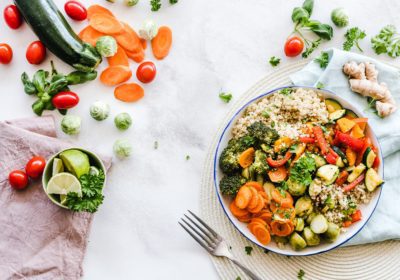
Have you ever felt so anxious about something that you want to throw up? Have you ever had bad stomach pains that make you anxious?
There is a strong relationship between your gut and your brain that can be used as a
Believe it or not, the gut dictates more than just digestion. The bacteria that live inside the gut send important messages throughout the body. These messages impact hormone levels and have the potential to change how much anxiety you have.
The Gut’s Role in Anxiety
The gut consists of the stomach, small intestine, and large intestine. There is a literal connection between the gut and brain rightfully called the gut-brain axis. This communication channel allows the gut to talk with areas of the brain that control how we think and what we feel.
Every person carries around 4 pounds of bacteria in their gut, which is made up of the small and large intestine. This bacteria consists of “good” and “bad” bacteria.
Organisms (mostly bacteria) in the gut influence serotonin and dopamine production. A whopping ninety percent of the bodies serotonin is found in the gut. Serotonin is a messenger in the brain that effects happiness and well-being as well as levels of anxiety and depression. Many medications for anxiety and depression, like SSRI’s, adjust levels of serotonin to reduce symptoms. There is increasing information that indicates that a healthy gut can lower stress hormones and increase GABA, which helps relieve anxiety.
The brain-gut connection is a two-way street. Researchers are discovering that irritation in the GI tract may send signals to the brain that cause mood changes and the development of anxiety and depression. This may help explain the strong link between Irritable Bowel Syndrome (IBS) and anxiety/depression.

How to Heal your Gut
The bacteria that make up your gut is mostly determined as a young child. By age three your gut bacteria has basically been settled. Although you can’t really change your gut bacteria, you can change what that bacteria
Reducing stomach irritation is a great first place to start when healing the gut. Refined and processed foods irritate the stomach lining. Removing them from your diet reduces disturbance to your gut. Avoiding inflammatory foods while (yes the obvious) eating anti-inflammatory foods is extremely beneficial for your gut. Inflammation causes irritation of the gut which can cause anxiety.
Inflammatory Foods
Omega-6 Fatty Acids
Processed Meats
Refined Carbohydrates
Alcohol
Vegetable Oil
Dairy Products
Sugar
Fried Foods
Anti-Inflammatory Foods
Omega-3 Fatty Acids
Avocado
Fatty Fish
Berries
Extra-Virgin Olive Oil
Flax Seed
Dark Leafy Greens
Broccoli
Green Tea
Dark Chocolate
Turmeric
Introducing probiotic foods help restore the gut by introducing good bacteria into your gut microbiome. When you think probiotic foods, think of fermented foods. A study at UCLA shows that women who consume probiotics through eating yogurt regularly exhibit altered brain activity to be less emotionally driven. Studies linking probiotics and anxiety reduction are promising and call for further research to better understand.
Prebiotic foods help feed good bacteria in the gut. Neurobiologists at Oxford University tested the effects of prebiotics on anxiety. The
This is a similar effect shown in individuals who take an anti-depressant or anti-anxiety medication. The prebiotic individuals also had lower cortisol levels, the stress hormone. Introducing activities that reduce cortisol can be infinitely beneficial for anxiety and the body.
Probiotic Foods
Yogurt
Kimchi
Kefir
Kombucha
Tempeh
Saurkraut
Miso
Cottage Cheese
Pickles
Nattō
Prebiotic Foods
Chicory Root
Garlic
Onion
Banana
Oats
Flax Seed
Asparagus
Apple

Take it Slow to Restore the Gut
Food sources are the best place to get good gut building nutrition. When you are learning how to heal your gut, starting with diet is key. It is also understandable that nutrition can be slightly intimidating due to varying opinions even amongst experts. Adding supplements for gut health can be beneficial, especially if you are just starting out or have a restricted diet.
Take it from me and start out slow when adding prebiotic or probiotic sources to your routine. The first time I added probiotics to my diet I jumped in full force. Eating kefir twice every day came with some interesting womanly side effects (I won’t divulge here but if you want to know you can ask me.)
Remember you are altering a major powerhouse of the body so slow consistency can do you a few favors. No fear here though, if something doesn’t work for you (like kefir for me) then just try something else!


